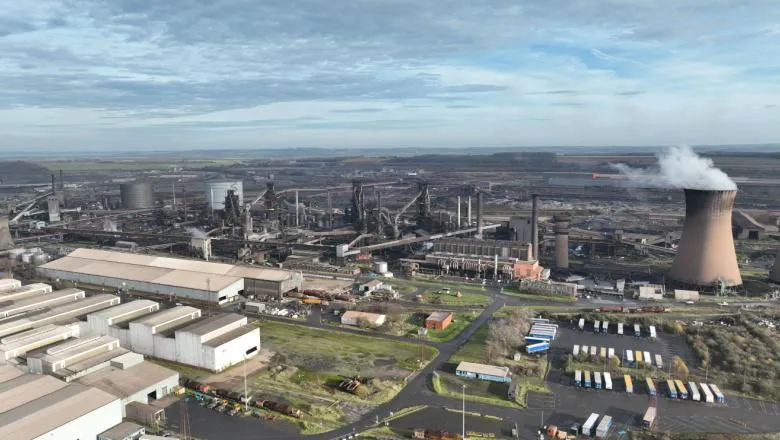Chinese companies are going to figure in the world in the future, they’re appearing in things like AI, they’re appearing in areas like life sciences, environmental sciences. China is now producing important technology. It’s a huge shift that we didn’t really expect. And that means we’re not in the kind of position we were in the past where we had technology China wanted, it’s the other way around. This example is a cautionary tale, the way that the experience has been between Britain and China with this steel factory it’s not good. We’ve got to do better on both sides.
Kerry Brown, Professor of Chinese Studies and Director of the Lau China Institute at King’s College London
16 April 2025
Scunthorpe steelworks: The UK's trade relationship with China
Professor Kerry Brown, Director of the Lau China Institute, spoke to ITV News anchor Nina Hossain about the UK’s trade relationship with China after the UK government took control of Britain’s steel site in Scunthorpe at the weekend. Read the interview below.

How concerned or otherwise should we be about China’s investment in the UK, in the steel industry and beyond?
First of all, there isn’t a massive amount of Chinese investment in Britain, its about 0.2% of our overall stocks. It’s mostly Europeans and Americans that invest here. We’re not talking about big numbers. The Chinese record of investment in Britain has always been pretty patchy and pretty turbulent. I mean 20 years ago they invested in MG Rover car company and that was problematic for different reasons, they invested 6 billion in Hinckley Point nuclear station, that didn’t work out. So in a sense, this is really kind of less surprising than it might appear.
The anomaly though is that it’s the second biggest economy in the world, China, it’s a 5th of global GDP. As we go into really tough economic times, we can certainly be kind of choosy and picky about the investment that comes here but it is an opportunity cost because the more we say no, the less that’s likely to come.
And what about the areas that China has chosen to invest in? You mentioned nuclear power, water companies, a key industry – steel industry. How did we get here and should successive gov’s have paid more attention to this patchy investment in different key infrastructure areas in this country?
Its certainly true Britain has tended not to think a great deal about the kind of companies its dealing with. In these big infrastructure areas, its state companies mostly in China. Of course they are very strongly linked to the government and I don’t think the problem is that they want to come and you know sabotage the British economy. I think the problem is that they are pretty ruthless in the way they operate. They don’t really think a lot about, you know, the broader context of their investments. They want to see returns and if they don’t see returns which I think is what has happened with this steel company, then they tend to go away really really quickly and that’s a problem. They don’t really commit. Japanese and South Korean companies tend to be a bit more careful about the environment they’re investing in. Chinese, I think, are not that experienced but also pretty ruthless in the way they judge opportunities and when they think they’re not delivering they do tend to just up sticks and go.
Isn’t this part of the problem and certainly the concerns raised by some people in the light of what’s happened over the weekend and in the last few days that do we really know how much control over the Chinese companies the Chinese government has?
Their mandate is to make money. That’s not a mystery. They’re making money for principally the Chinese government. The Chinese government then spends that money back in China or does whatever it wants with it. It’s a highly centralised state run economy; there’s no mystery about that. We’ve dealt with economies like this in many other places. Here’s the problem for Britain, we have 0.1% growth. We have very big problems with productivity. We don’t have an easy relationship with Europe or America although maybe these will improve soon, who knows. China is a 5th of global GDP, second largest economy in the world. It could invest more here and in the current context, saying no to that investment, yes we can do that but we do say no to a bigger thing than we did in the past. In 2005, Britain’s economy was the same size as China’s. Now China is five and a half times bigger than our economy so that’s the difference.
The accusation that Chinese owners of the Scunthorpe plant had sabotaged production there because it had cancelled the orders of raw materials. The UK government said it doesn’t see any evidence of sabotage. Do you agree?
I think if it was sabotage it’s a terrible time for it to happen. China is under very big tariffs from the US, its in the middle of a savage trade war. I don’t think China is in the business of antagonising others now as it faces by way and far its most important and formidable partner, the United States. So if it was sabotage, they have chosen a terrible time to do it. I do tend to agree with the [UK] Government, I think this is just really bad management, its bad timing. You have to question how prepared some Chinese investors are coming here. There needs to be way more education on both sides. I mean we have fought too. We don’t have the education levels we need to deal with Chinese partners. They do have things they can offer and they increasingly have technology that we might need to have access to. So it’s a complicated picture. We need to be way way better prepared for it than we are at present.
Where does that preparation come from? Where does that expertise come from when dealing with a foreign country that we don’t really know what is going on and what their intentions are.
I think we have to take a deep breath and have earlier education about cultures and environment’s beyond just Europe. Chinese companies are going to figure in the world in the future, they’re appearing in things like AI, they’re appearing in areas like life sciences, environmental sciences. China is now producing important technology. It’s a huge shift that we didn’t really expect. And that means we’re not in the kind of position we were in the past where we had technology China wanted, it’s the other way around. This example is a cautionary tale, the way that the experience has been between Britain and China with this steel factory it’s not good. We’ve got to do better on both sides. And I think China it would find it in its interests to have better relations with what is still the world’s 5th, 6th biggest economy, Britain, its an important economy. We definitely do need to have better relations, in the services sector we certainly do better than in manufacturing with China.
How further exposed are we if the trade war between China and the US escalates given the investment in the UK from China?
I think everyone is badly exposed. The longer it goes on the more likely it will lead to some kind of recession, that would be bad for China, bad for us, bad for the US. It will really be lose lose. I don’t think China is going to back down in this fight. I mean its got all of the resources it needs at the moment, it can certainly last longer than others but its in no one’s interest in the end for this to go on very much longer. There’s got to be a deal between the US and China, for them and for the good of everyone else.
All your answers have related to the future of the economy, the UK’s economy, China’s economy and the global economy. Have you any security concerns about China’s current investment in the UK?
Yes of course, China is not a political ally, its an opportunist and it will pick on vulnerabilities where they happen, where it sees them. So we do have to be very aware of where we might be vulnerable and I think we’ve done a lot of thinking about that. I think the current government is pragmatic, it knows that Chinese investment in telecoms and areas like this isn’t going to work not only because of issues with China but because the US has big issues with us dealing with China in that way. I think we have to be very very clear about where we want that investment and where we don’t and I think we’ve got to be consistent. We’re kind of getting there but as this sort of case shows we’ve got a way to go before we can be completely comfortable and we’ll never really deal with the risk, it will always be there, we just have to be constantly vigilant.

